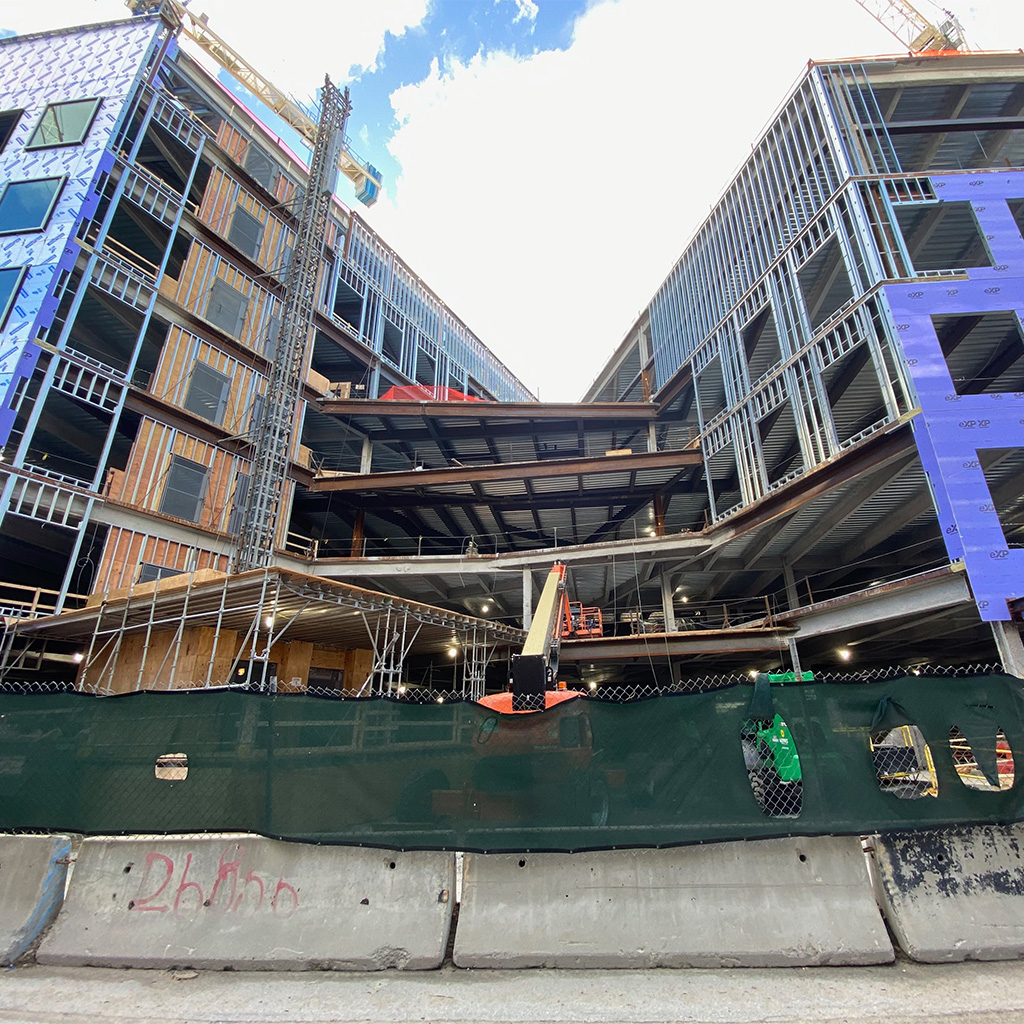Offset options against greenhouse emissions could tighten for Cambridge’s bigger buildings

Construction around Cambridge’s Kendall Square seen April 17, 2022. (Photo: Marc Levy)
The controversial amendments to the Building Energy Use Disclosure Ordinance – or Beudo – are changing yet again on their way to Monday’s meeting of the City Council. The council’s Ordinance Committee asked the Community Development and Law departments at a meeting Wednesday to create language that would change the composition of a planned exemption review board, change standards for carbon offsets and make the first policy review come sooner.
These latest amendments were put forward by councillors Quinton Zondervan, Patty Nolan and Mayor Siddiqui.
The Community Development Department submitted amendments in 2021 to Beudo that add emission reductions requirements. It was part of a planned review of the 2014 regulation, which required disclosure of emission levels for certain large buildings in Cambridge but did not have the effect of reducing greenhouse gas emissions.
Under the latest proposed version of the amendments, building owners will need to start paying penalties as early as 2026 if they don’t manage to bring net emissions down to 80 percent of what was measured in 2018 and 2019 for existing buildings, with further reductions required year over year. If the buildings became occupied later, they would be required to start paying penalties four years after the initial two-year measurement period. Commercial buildings of more than 100,000 square feet in floor area will be allowed to use offsets to reduce their net greenhouse gas emissions, but only until 2045.
Non-residential buildings of more than 100,000 square feet will be expected to be net zero by 2035, followed by affordable housing and existing market-rate housing with more than 50 units in 2050.
Exemptions from these requirements would be reviewed by a board. A previous version of amendments would have had the board made up of five technical experts, two business representatives and two environmental advocates. The requested amendments presented on Wednesday would have a board of five technical experts, two business representatives, a renter and a homeowner, with at least half being climate advocates and climate scientists.
Change to offset options
The use of carbon offsets to meet reduction goals will cover only some of the required reduction and will be allowed only by commercial buildings of more than 100,000 square feet. The latest amendment to this rule requires those offsets to be local or regional unless local or regional offsets are not available. They must also meet stringent standards.
Susan Murcott, a lecturer at the Massachusetts Institute of Technology’s D-Lab who is researching the carbon offset market with her graduate students, was at the meeting to comment on offsets. She said that the preliminary findings of her research suggest that “the current carbon offsets market did not reliably offset carbon and in some cases may even worsen global warming.”
She listed a few different evaluation frameworks for offsets that seek to make them more effective, including frameworks that the amendment sponsors suggested.
Originally, the amended Beudo was to be reviewed in 2032; another amendment moves that review date to 2028.
Bigger buildings stay the target
The only proposed amendment that was not passed in committee would have lowered the proposed floor area for buildings that would be required to follow the faster reductions requirements to 50,000 square feet.
“The larger buildings, 100,000 square feet and greater, both have more resourcing and ability to meet that aggressive timeline,” said City Manager Yi-An Huang, referring to the thinking of the Community Development Department. “And they represent the bulk of the emissions.”
He also said that the CDD is concerned about the ability of smaller buildings to meet more stringent timelines.
Vice mayor Alanna Mallon also introduced a request for amendment language that would ensure that buildings that have two or more owners would not be included on the 2035 timeline – a step that would mostly prevent condo owners from needing to pay penalties.
The committee also set a deadline of May 31 for the Community Development and Law departments to complete ordinance’s language.




A great effort. Let’s hope the Council is wary of poison pills that could prevent the plan from meeting its goals. Vice Mayor Mallon’s amendment to exempt buildings with two or more owners, just for example, would encourage owners of single-owner buildings to sell a few shares to a friend in order to skirt the rules.
If the goal is to spare condo owners who might not have sufficient financial backing to implement changes, we should do that explicitly and with tight rules